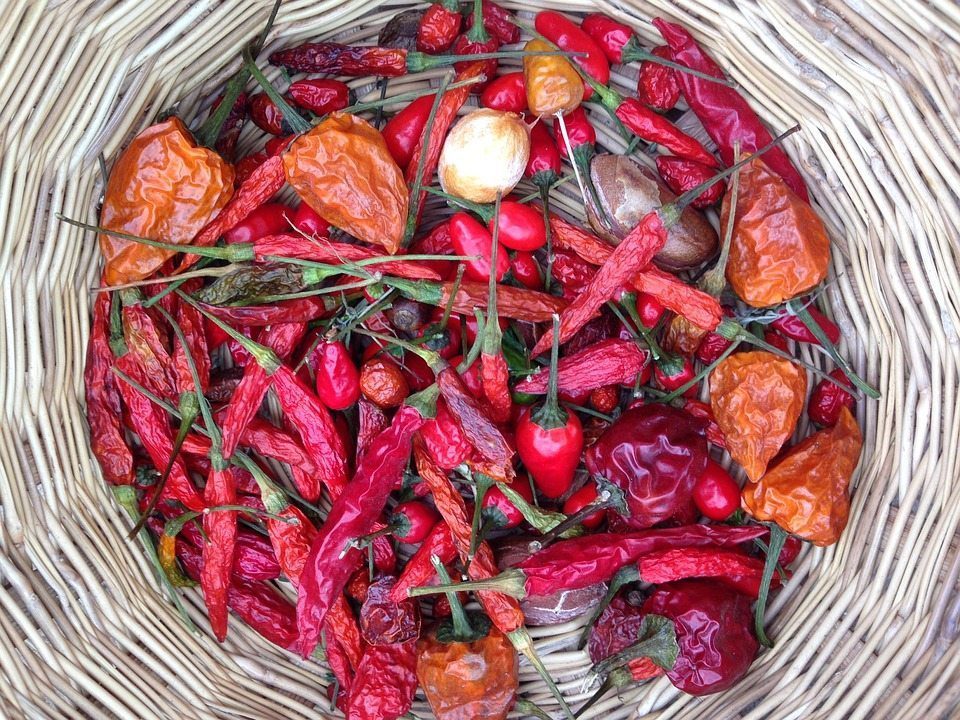[dropcap style=”font-size:100px; color:#992211;”]E[/dropcap]ating chilis makes you live longer? So it would seem.
Erk. Rewind.
Actually, before this article gets tagged with the #fakenews moniker (which it would deserve if we were to leave that opening claim unqualified), let’s examine exactly what the research does claim.
Chilis won’t make you live longer per se, but being the kind of person who eats them might do. Or, more accurately still, avoiding being the kind of person who thinks ‘I’m not eating that foreign Ottolenghi muck, it’s fried breakfasts and lard roly poly for me, Nanny’ is the key.
And anyway, without chilis, what would be the point in living longer?
Like spicy food? If so, you might live longer, say researchers at the Larner College of Medicine at the University of Vermont, who found that consumption of hot red chili peppers is associated with a 13 percent reduction in total mortality – primarily in deaths due to heart disease or stroke — in a large prospective study.
Going back for centuries, peppers and spices have been thought to be beneficial in the treatment of diseases, but only one other study — conducted in China and published in 2015 – has previously examined chili pepper consumption and its association with mortality. This new study corroborates the earlier study’s findings.
Using National Health and Nutritional Examination Survey (NHANES) III data collected from more than 16,000 Americans who were followed for up to 23 years, medical student Mustafa Chopan ’17 and Professor of Medicine Benjamin Littenberg, M.D., examined the baseline characteristics of the participants according to hot red chili pepper consumption. They found that consumers of hot red chili peppers tended to be “younger, male, white, Mexican-Ame rican, married, and to smoke cigarettes, drink alcohol, and consume more vegetables and meats . . . had lower HDL-cholesterol, lower income, and less education,” in comparison to participants who did not consume red chili peppers. They examined data from a median follow-up of 18.9 years and observed the number of deaths and then analyzed specific causes of death.
rican, married, and to smoke cigarettes, drink alcohol, and consume more vegetables and meats . . . had lower HDL-cholesterol, lower income, and less education,” in comparison to participants who did not consume red chili peppers. They examined data from a median follow-up of 18.9 years and observed the number of deaths and then analyzed specific causes of death.
“Although the mechanism by which peppers could delay mortality is far from certain, Transient Receptor Potential (TRP) channels, which are primary receptors for pungent agents such as capsaicin (the principal component in chili peppers), may in part be responsible for the observed relationship,” say the study authors.
There are some possible explanations for red chili peppers’ health benefits, state Chopan and Littenberg in the study. Among them are the fact that capsaicin – the principal component in chili peppers – is believed to play a role in cellular and molecular mechanisms that prevent obesity and modulate coronary blood flow, and also possesses antimicrobial properties that “may indirectly affect the host by altering the gut microbiota.”
“Because our study adds to the generalizability of previous findings, chili pepper — or even spicy food – consumption may become a dietary recommendation and/or fuel further research in the form of clinical trials,” says Chopan.
Source: Eurekalert/University of Vermont
Image: Pixabay/Jeawedtha

Some of the news that we find inspiring, diverting, wrong or so very right.




















![L'Esprit comique [Der komische Geist], René Magritte, 1928. Courtesy Sammlung Ulla und Heiner Pietzsch, Berlin © 2025, ProLitteris, Zurich Photo Credit: Jochen Littkemann, Berlin](https://b276103.smushcdn.com/276103/wp-content/uploads/2025/07/ew11_0098489_2025-05-12_web-140x174.jpg?lossy=1&strip=0&webp=1)

